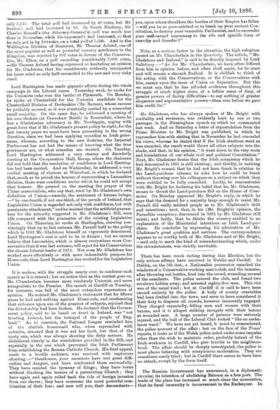Lord Hartington has made gigantic efforts during the whole campaign
in the Liberal cause. Yesterday week, he spoke for the Unionists (who won the battle) at Plymouth. On Monday, he spoke at Chesterfield for the Unionist candidate for the Chesterfield Division of Derbyshire (Mr. Barnes), whose success he probably secured, as it was eventually carried by a somewhat small majority. On the same day, he addressed a meeting of his own electors (at Crawshaw Booth) in Rossendale, where he has a Gladstonian adversary in Mr. Newbiggin, urging with great force that if Mr. Gladstone's present policy be right, for the last twenty years we must have been proceeding in the wrong direction, since we had been applying remedies to Irish griev- ances, whereas, according to the new doctrine, the Imperial Parliament has not had the means of knowing what the true grievances are, or what remedies are wanted. On Tuesday, Lord Hartington addressed a very stormy and disorderly meeting at the Co-operative Hall, Bacup, where the chairman did not hold that the resolution of confidence in Lord Harting- ton had been carried. And on Wednesday, he addressed a very cordial meeting of electors at Waterfoot, in which he declared that, much as he prized the honour of representing a Lancashire division, there were conditions under which he could not accept that honour. He pressed on the meeting the prayer of the Ulster memorialists, who say that, tried by Mr. Gladstone's own definition of Union,—namely, the sentiment of human beings, —" by one-fourth, if not one-third, of the people of Ireland, that Legislative Union is regarded not only with confidence, but with passionate attachment;" and he insisted that the artificial guaran- tees for the minority suggested in Mr. Gladstone's Bill, were idle compared with the guarantee of the existing Legislative Union. On Thursday, he spoke at Haslingden, showing con- vincingly that up to last autumn Mr. Parnell held to the policy which in 1881 Mr. Gladstone himself so vigorously denounced. Lord Hartington's seat is said to be in danger ; but we cannot believe that Lancashire, which is almost everywhere more Con- servative than it was last autumn, will reject for his Conservatism the chosen Liberal leader of 1874. Not even Mr. Gladstone has worked more effectively or with more indomitable purpose for Home-rule, than Lord Hartington has worked for the Legislative Union.
















































 Previous page
Previous page